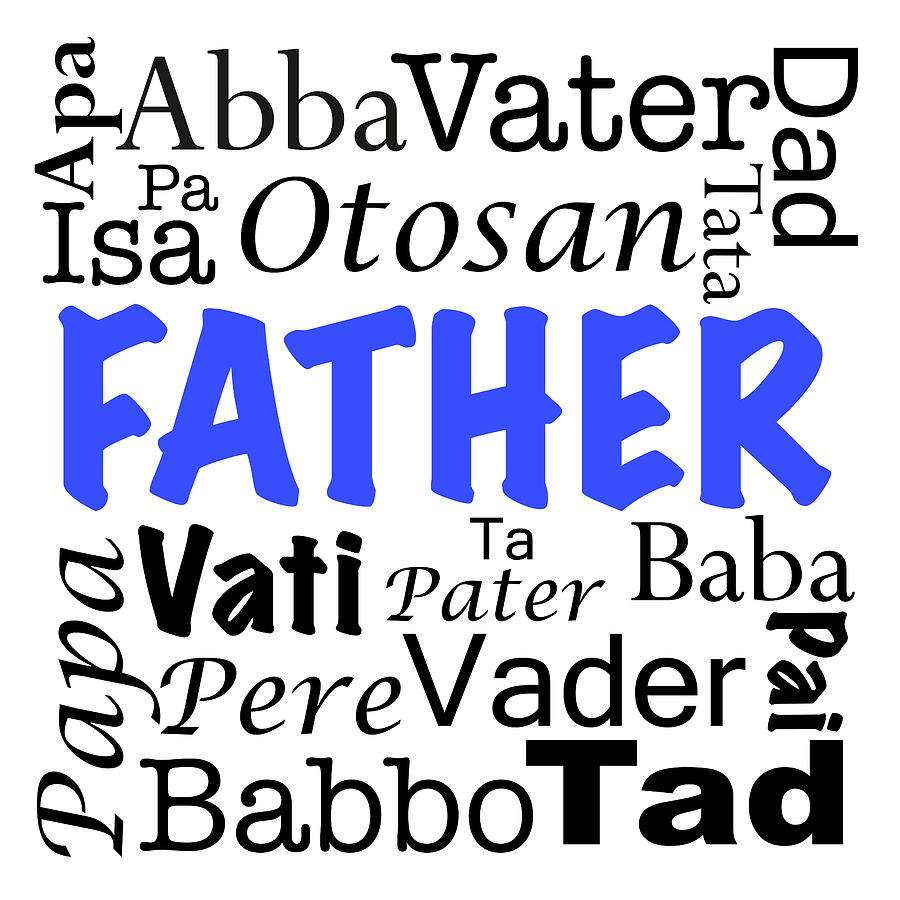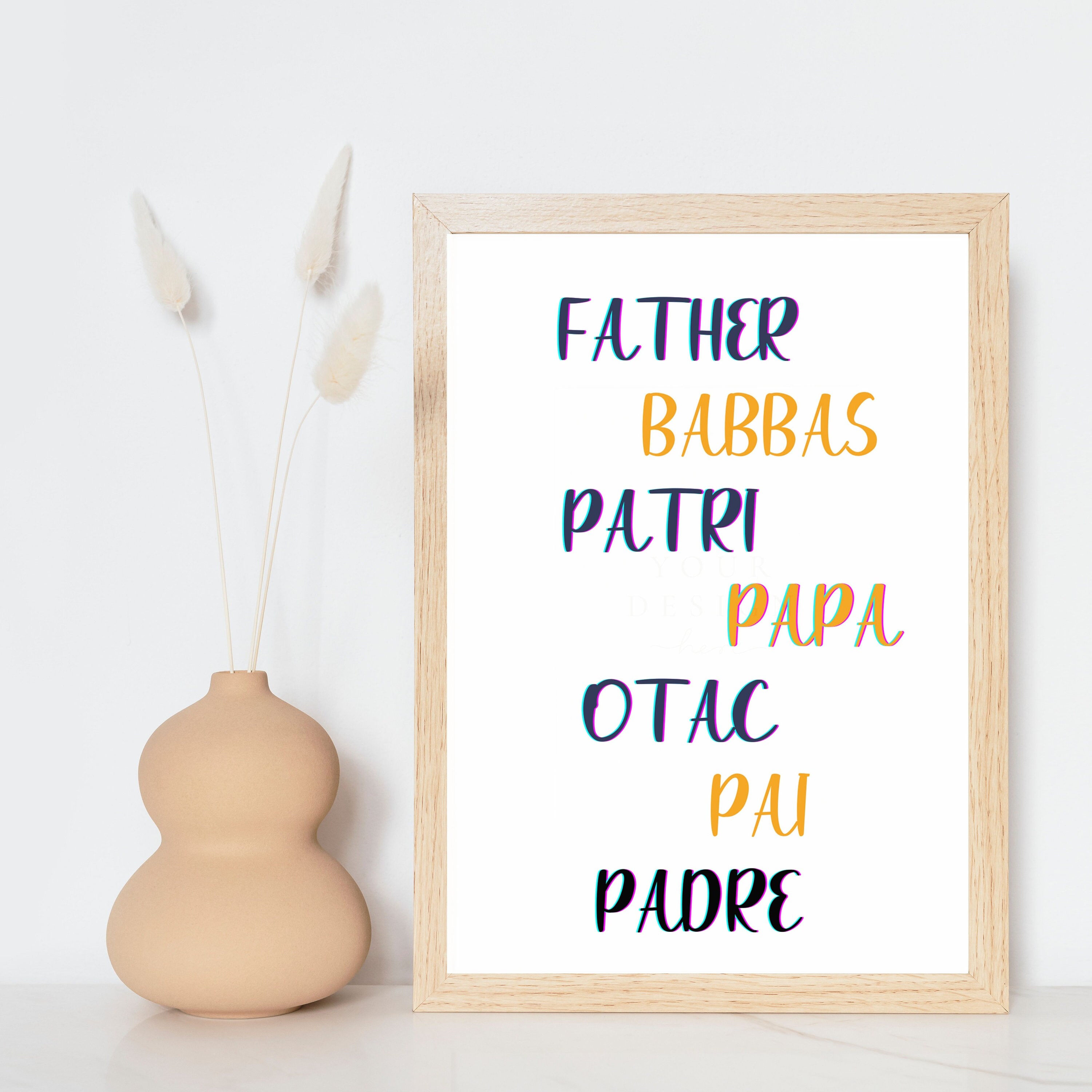Dad in different languages embarks on a linguistic odyssey, unraveling the diverse cultural nuances and historical evolution of this universally recognized term. From its etymological roots to its contemporary usage, this exploration delves into the rich tapestry of fatherhood across languages and cultures.
As we embark on this linguistic journey, we will uncover the myriad ways in which languages shape our perceptions of fatherhood and explore the profound impact of cultural contexts on the roles and expectations associated with dads.
Translations of “Dad” in Different Languages

Fathers are important figures in our lives, and their role is recognized and celebrated in cultures worldwide. The word “dad” has various translations in different languages, reflecting the diversity of human languages and the significance of the father-child bond.
The following table provides a comprehensive list of translations for “dad” in various languages around the world. The translations are organized by language, translation, and pronunciation (if applicable):
Language
| Language | Translation | Pronunciation |
|---|---|---|
| English | Dad | /dæd/ |
| Spanish | Padre | /ˈpaðɾe/ |
| French | Père | /pɛʁ/ |
| German | Vater | /ˈfaːtɐ/ |
| Chinese | 父亲 | /fùqīn/ |
| Hindi | पिता | /pitɑː/ |
| Arabic | أب | /ʔab/ |
| Russian | Отец | /ɐˈtʲets/ |
| Japanese | 父 | /tʃitʃi/ |
| Portuguese | Pai | /pai/ |
Cultural Connotations of “Dad”
The term “dad” carries diverse cultural connotations that shape the roles and expectations of fathers within different societies.
In Western cultures, “dad” often embodies the traditional patriarchal figure, responsible for providing financial stability and discipline. However, in recent decades, there has been a shift towards a more nurturing and involved role, with fathers increasingly participating in childcare and emotional support.
Asian Cultures, Dad in different languages
In many Asian cultures, “dad” holds a position of authority and respect. Fathers are seen as the head of the household, and their decisions are often final. They are also expected to be the primary breadwinners and providers for their families.
However, there is also a growing emphasis on the emotional connection between fathers and children in Asian cultures. Fathers are increasingly expected to be present and supportive in their children’s lives.
African Cultures
In African cultures, “dad” often represents a strong and protective figure. Fathers are seen as the guardians of their families, responsible for ensuring their safety and well-being. They are also expected to be role models for their children, teaching them important values and traditions.
In many African cultures, fathers are also expected to be actively involved in their children’s upbringing. They participate in childcare, discipline, and education, and they play a vital role in shaping their children’s character.
Historical Evolution of “Dad”
The term “dad” has a long and rich history, with its origins in the Proto-Indo-European language. From its humble beginnings, it has undergone significant changes in meaning and usage, reflecting the evolving roles and expectations of fathers throughout history.
In its earliest form, the word “dad” was likely used to refer to a father or protector. Over time, it took on a more specific meaning, becoming synonymous with the role of a father in a family unit.
Etymology of “Dad”
The etymology of “dad” can be traced back to the Proto-Indo-European root -deH2-, meaning “to suckle” or “to feed.” This suggests that the term was originally used to refer to the role of a father as a provider and nurturer.
In many Indo-European languages, the word for “father” is derived from this same root. For example, the Latin word “pater” and the Greek word “pater” both share this common origin.
Changing Roles of Fathers
The meaning and usage of “dad” have also evolved over time to reflect the changing roles of fathers in society. In the past, fathers were primarily seen as providers and disciplinarians. However, in recent decades, there has been a growing emphasis on the importance of fathers being involved in all aspects of their children’s lives.
This shift in societal expectations has been reflected in the way that “dad” is used. Today, the term is often used to refer to a father who is actively involved in his children’s lives, providing both emotional and physical support.
“Dad” in Literature and Media

The portrayal of fathers in literature, film, and other media has significantly influenced societal perceptions of fatherhood. These portrayals reflect the evolving cultural norms, expectations, and challenges associated with the role of a father.
In classical literature, fathers were often depicted as authoritarian figures, embodying strength and wisdom. Examples include Homer’s Zeus and Shakespeare’s King Lear. However, in modern literature and media, fathers are portrayed with greater complexity and vulnerability.
The Absent Father
The absent father is a recurring theme in literature and film. This portrayal reflects the increasing number of families headed by single mothers and the challenges faced by children growing up without a father figure. In Harper Lee’s “To Kill a Mockingbird,” Atticus Finch is a widowed father who struggles to raise his children while upholding his principles.
The Distant Father
The distant father is another common portrayal in media. This character is emotionally or physically detached from his children, often due to work or personal issues. In Arthur Miller’s “Death of a Salesman,” Willy Loman is a distant father who fails to connect with his sons.
The Superhero Father
In contrast to the absent or distant father, the superhero father is a positive portrayal that celebrates the role of fathers as protectors and role models. This character is often depicted as strong, brave, and supportive. In the film “The Incredibles,” Mr.
Incredible is a superhero father who balances his crime-fighting duties with his family responsibilities.
The Evolution of Fatherhood
The portrayals of fathers in literature and media have evolved over time, reflecting changing societal norms and expectations. In the past, fathers were seen primarily as breadwinners and disciplinarians. Today, fathers are increasingly involved in childcare and nurturing.
These portrayals continue to shape societal perceptions of fatherhood, influencing how fathers view themselves and how they are perceived by others.
Slang and Colloquialisms Related to “Dad”: Dad In Different Languages

The term “dad” has numerous slang and colloquial variants that have emerged over time. These terms often reflect cultural and societal attitudes towards fatherhood and the role of fathers within families.
One common slang term for “dad” is “old man.” This term is often used affectionately and humorously to refer to one’s father, particularly in casual or informal settings. It may also be used to denote a sense of respect or familiarity.
Another slang term for “dad” is “pops.” This term is derived from the word “pop,” which is a shortened form of “father.” “Pops” is often used in African American Vernacular English (AAVE) and is considered a term of endearment.
In some cultures, “dad” may also be referred to as “daddy.” This term is often used by young children and conveys a sense of closeness and affection. It may also be used in a romantic or playful context between adults.
Ultimate Conclusion
Our exploration of dad in different languages concludes with a deeper understanding of the multifaceted nature of fatherhood. We have traversed diverse linguistic landscapes, uncovering the intricate ways in which languages reflect and shape our perceptions of this fundamental human relationship.
This journey has not only expanded our vocabulary but also enriched our appreciation for the diverse cultural expressions of love, care, and responsibility that define dads around the world.
FAQ Corner
What is the most common translation for “dad” in other languages?
The most common translation for “dad” across many languages is “father”.
How does the cultural context influence the role of dads?
Cultural contexts play a significant role in shaping the roles and expectations associated with dads. In some cultures, dads are seen as the primary breadwinners and disciplinarians, while in others, they share childcare responsibilities more equally with mothers.
How has the term “dad” evolved over time?
The term “dad” has evolved from its origins as a respectful form of address for an older man to its current usage as a term of endearment for fathers.